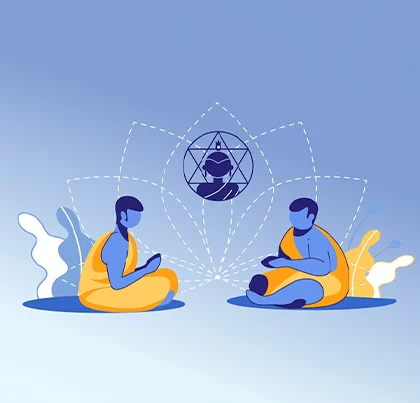4 Questions To Change Your Thoughts About Life
“A thought is harmless unless we believe it. It’s not our thoughts, but our attachment to our thoughts, that causes suffering. Attaching to a thought means believing that it’s true, without inquiring. A belief is a thought that we’ve been attaching to, often for years.” – Byron Katie
We all walk through life with stories and beliefs about ourselves and the people in our lives. These stories paint our view of the world and our place in it. Anyone who has gone through addiction knows that these stories are more like nightmares, and the idea of living anything else seems like a distant hope.

When someone enters recovery, they not only need to change their external world, they need to change their inner as well. Change starts with what we believe. Our beliefs about ourselves, about our families, about our abilities, about everything. To change the world, we have to change what we believe.
Byron Katie, in her book Loving What Is, asks four simple questions to facilitate this process. The process outlined she calls “The Work.” It’s not just the work of recovery; it’s the work of daily living. The Work is staying in the present with what is real and honest. With all our stories from the past, and our assumptions about the future, it truly is work. Essential for recovery is learning to be fully honest with ourselves and others. To be completely honest with ourselves we have to be able to live in what is.
The Work is a process that enables a person to identify and question any stressful thought that causes them to suffer. When a person believes a thought such as “she always hurts me, He doesn’t love me anymore, she abandoned me, I can never stay sober, no one will accept me sober, etc.” they suffer and live in pain. Many people spiral into depression, self-harm, and even death by using drugs and alcohol.
The Work is a simple format that consists of 4 questions and a turnaround.
The First Question
The first question is simply, is it true? How often do we all hold on to beliefs that when fully examined, are not even known to be true? When we are confronted with a belief that is part of our suffering, we should first ask if it’s even true. Often this belief is so ingrained in a person’s mind that the answer is automatically yes.
The Second Question
Which leads to the second question, can you absolutely know it’s true? This question forces us to evaluate even if we believe something is true, is it factual. Could the belief be proven in a court of law? If the answer at this point is yes, then we need to accept the situation as fact and find a way to cope. What we usually find is that no matter how much we hold to a belief, we can’t say that we know it’s absolutely true.
The Third Question
The third question then is how do you react when you believe that thought? The person evaluates what emotions, behaviors, and responses are produced when they believe that thought. They ask does that thought bring peace or stress? What emotions do you feel? What obsessions or addictions manifest when you believe that thought?
The Fourth Question
The fourth question then is simply, who would you be without that thought? The fourth questions allows the person to picture a life free from that thought, and free from the suffering it produces. If a person can picture a life without that thought, and it’s been confirmed that it’s not absolutely true, then perhaps they can be lead to a thought that this more honest or produces less suffering.
We break free from the harmful belief with a turnaround. You can turn the thought around to the opposite (He didn’t hurt me, or he helped me), to self (I hurt me), or to the other (I hurt him). If the turnaround is found to be truer, the person then directs their thoughts to focus on the truth rather than the old story they’ve lived in for so long.
What seems like a simple process is a continuous experience of noticing the stories that arise and directing back to what is. An example of working through this process might look like this:
Belief: “My family will never forgive me for what I’ve done.”
- Is it true? – “Yes, they tell me all the time how mad they are.”
- Can you absolutely know it’s true? “No, I can’t know the future or if they will ever forgive me. I couldn’t prove in a court of law that they’ll never forgive me.”
- How do you react when you believe that thought? “I avoid my family. I use drugs to mask the guilt I feel. I only hang around people that do the same things that I do, so I don’t feel judged. I focus on all the bad things I’ve done, I obsess over them and continue to relive the past.”
- Who would you be without that thought? “I could be around my family without feeling self-conscious. I could ask them for help if I needed it. I wouldn’t feel so guilty about all the things I’ve done. I’d stop spending my time trying to feel better because I would know that I am forgivable; I am loveable”.
Since we know this thought isn’t absolutely true, we look at a possible turnaround. To the opposite “My family has forgiven me for things I’ve done” Perhaps here the person can think of things their family has forgiven.
To the self “I haven’t forgiven me for the things I’ve done”. At this point, the person may see that their suffering is caused by resentments they hold about themselves. They can then see this and give themselves forgiveness, thus being more open to the forgiveness of others.
To the other “I haven’t forgiven others for what they’ve done to me”. Often the things we believe most about ourselves are things that we see in other people. Perhaps the person can now see the need to work the fourth step and let go of resentments.
At Brighton Recovery Center The Work is taught by a facilitator trained in using The Work, although anyone can use this process. When we question a stressful, we can look at it straight in the face and see the thought that is causing us to suffer. We can question that thought, and we can have a choice in letting that judgment go, and have peace. If I believe my stressful thoughts, I suffer, if I let that thought go, I don’t suffer. It’s that simple.



